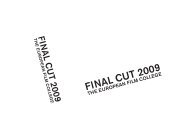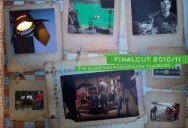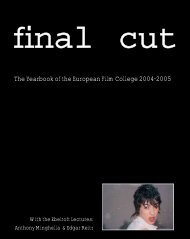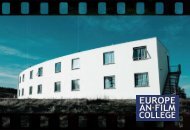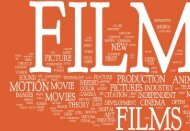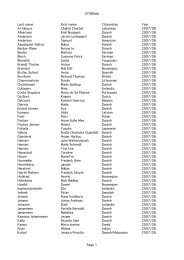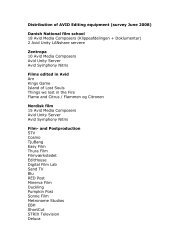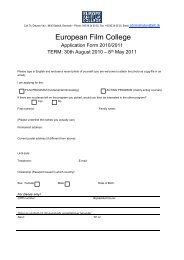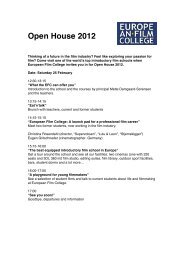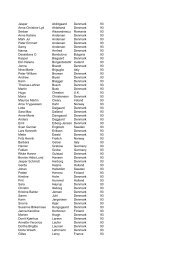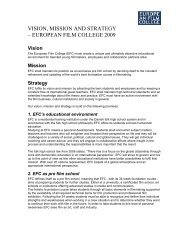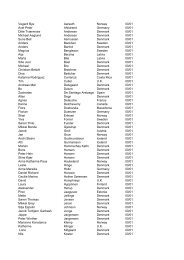yearbook 2004/05 - The European Film College
yearbook 2004/05 - The European Film College
yearbook 2004/05 - The European Film College
You also want an ePaper? Increase the reach of your titles
YUMPU automatically turns print PDFs into web optimized ePapers that Google loves.
tions, why do we shoot multiple<br />
cameras and what kind of<br />
productions require it. You will<br />
learn the process involved, commands<br />
and terminologies necessary<br />
to be part of the team, operate<br />
studio cameras, learn the<br />
technical jobs involved, working<br />
in the control room, directing<br />
cameras and switching for live<br />
television. You will be working as<br />
a team on different productions in<br />
the studio, technically and creatively.<br />
We will bring forward your<br />
idea, develop your skills to make<br />
decisions on visual format and<br />
picture composition, for your productions.<br />
Live television is a fast<br />
working, high-energy environment<br />
with fast results and great team-<br />
work.<br />
Director of photography<br />
This course is for students with<br />
camera and lighting experience.<br />
This is not a technical course, but<br />
a course where we will set focus on<br />
creative Camera work. We will look<br />
at composition and the right light<br />
for the scene. <strong>The</strong> students in this<br />
class will be given a script, (Jim¹s<br />
students will write)the directors<br />
(Esben¹s students) will prepare the<br />
actors for the scene and you will<br />
be given the opportunity to creatte<br />
the cinematic style. You will have<br />
a chance to experiment and find<br />
your own way to tell or support<br />
the story. Lights and camera will<br />
be your tools.<br />
Aslak Mildh:<br />
Sound Production<br />
Danish. Studied music production<br />
at Media Production Services<br />
1989-90, and in 1995 graduated<br />
as a sound engineer from the national<br />
<strong>Film</strong> and Television School<br />
in England, where he worked on a<br />
great number of films screened at<br />
various festivals around the world.<br />
Aslak has a broad background in<br />
sound production, ranging from<br />
music production at Danish Institute<br />
for Electro-acoustical Music<br />
to being sound desginer on drama<br />
and commercials at Easy <strong>Film</strong>.<br />
Since 1997 Aslak has been running<br />
his own studio facility while<br />
working as a freelance sound engineer<br />
for, among others, Channel<br />
4 <strong>Film</strong>s,<br />
DR, TV2, Nordisk <strong>Film</strong> and Zentropa,<br />
as well as on features and<br />
documentaries shot in Scotland,<br />
South Africa, Denmark, Spain<br />
and England. His credits include<br />
a BAFTA for best short in 1995.<br />
Aslak joined the EFC as a teacher<br />
in autumn 2002.<br />
Courses:<br />
Protools drivers licence<br />
We shall familiarise ourselves with<br />
the core functions of the Protools<br />
systems, used inhouse to facilitate<br />
post production sound for students<br />
productions. <strong>The</strong> course<br />
requires students to absorb quite<br />
a bit of technical info, but should<br />
also give people the opportunity to<br />
get their hand on the machines,<br />
and will finally give attendants a<br />
drivers licence for working in the<br />
sound studio.<br />
Protools, Sound studio and Music<br />
recording<br />
A partly theoretical and partly<br />
practical course culminating in<br />
the recording and mixing of our<br />
own recordings.<br />
<strong>The</strong> theoretical part takes place in<br />
the sound studio with a basic<br />
introduction to ProTools and studio<br />
inventory used for the various<br />
recording applications. <strong>The</strong> practical<br />
part involves recording of<br />
instruments, live or multi layered,<br />
acoustical considerations and<br />
mixing and mastering of finished<br />
products. This will be in collaboration<br />
with students playing or<br />
performing in the<br />
college.<br />
Jean Leander:<br />
Teaching assistant<br />
Danish. Teaching assistant. Edu-<br />
WHO´s WHO<br />
cated as stage director/actor from<br />
the Royal Danish <strong>The</strong>atre, 1963-<br />
67. Employed at the Royal Danish<br />
<strong>The</strong>atre until 1974. From 1974<br />
employed at Danish Broadcasting<br />
as producer, and I have produced<br />
approx. 2500 programs within<br />
the fields of current debates and<br />
magazines, language and the TV<br />
kitchen. In 1997 I chose to become<br />
a freelance TV producer and<br />
moved to Ebeltoft together with<br />
my family and I have worked from<br />
here since.<br />
James Fernald:<br />
Screenwriting<br />
American. Graduated with a cinema<br />
degree from Ithaca <strong>College</strong><br />
in upstate New York and studied<br />
scriptwriting in the UCLA<br />
Extension writers programme.<br />
Wrote a humour column for a<br />
suburban Boston (Massachusetts)<br />
newspaper prior to moving to<br />
St. Thomas in the US Virgin Islands<br />
for a stint is bartending on<br />
the beach. Arrived in Los Angeles<br />
in the early ´90s, working<br />
first as a script reader and then<br />
as a develoopment executive for a<br />
variety of film and television production<br />
companies. Also a proli-<br />
fic screenwriter, signed by the<br />
Writers and Artists Agency and<br />
Messina-Baker Management of<br />
Beverly Hills, and most recently<br />
the Above the Line Agency on<br />
Sunset Blvd. in West Hollywood.<br />
Courses:<br />
Essentials of screenwriting<br />
In this class students will study<br />
scenes and characters from films<br />
both good and bad, to see what<br />
works and what doesn’t in regards<br />
to the big picture. <strong>The</strong> objective<br />
is for each student to create a dynamic<br />
character of their own and<br />
place them in a scene or sequence<br />
of scenes that ideally could be<br />
made into a short film, yet could<br />
possibly be part of a bigger picture.<br />
<strong>The</strong>re’s many a feature film<br />
out there that originally started as<br />
a great short film which caught the<br />
attention of the movers and shakers.<br />
Here’s looking at you, kid.<br />
12 films about you<br />
This is a writer intensive introductory<br />
screenwriting workshop that<br />
will focus on what are typically the<br />
best scripts to come from novice<br />
screenwriting students - storeies<br />
about themselves. Using a variety<br />
of tools to jog your memory,<br />
students will be prodded to write<br />
both humorous and dramatic stories<br />
from their past, with some<br />
embellishment, if needed. <strong>The</strong><br />
title is actually a challenge, the belief<br />
being that all of us have at<br />
least a dozen stories in our past<br />
that could be developed for film.<br />
However, the aim is for each student<br />
to write and refine several<br />
scripts that could be filmed later in<br />
the academic year. Learning from<br />
the past, students will also get to<br />
view former EFC student films<br />
to see why they worked, and why<br />
they didn’t, with the hope that<br />
they can emulate or improve on<br />
our cinematic history here at the<br />
EFC. Set in Big Bear, we will also<br />
watch several feature films to see<br />
how seemingly small stories about<br />
one self, can turn into the big picture.<br />
Lord of the Flies<br />
Based on William Golding’s classic<br />
novel, Lord of the Flies, this class<br />
will explore the dynamics of writing<br />
a feature film based on existing<br />
material (both book and two<br />
inferior film adaptations). <strong>The</strong><br />
unique concept of this class is to<br />
actually write a group screenplay<br />
of feature film length, that<br />
is, 100 to 120 pages. Each student<br />
will develop a character to place<br />
on the island and a vote will ensue<br />
to determine the hierarchy of<br />
characters - from the protagonist<br />
and antagonist, to the first victim.<br />
Following group agreement on<br />
characters, all writers will study<br />
each individual biography so all<br />
participants will know intimately<br />
all the players, then the story itself<br />
will be developed, with feature<br />
film structure applied.



